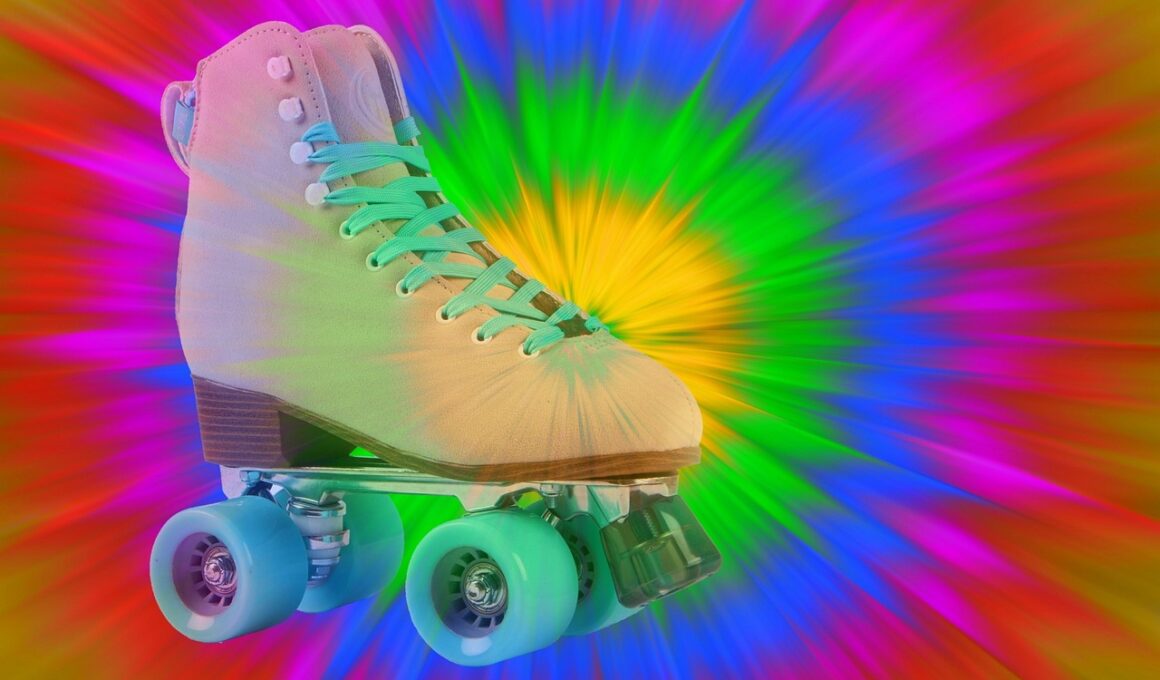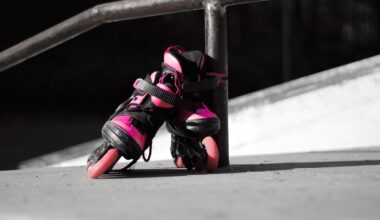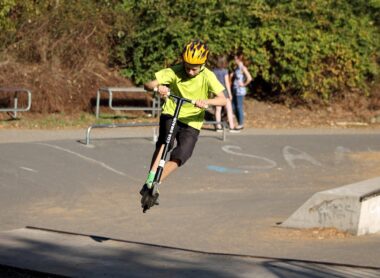The Psychology Behind the Inline Skating Lifestyle Commitment
Inline skating is not simply a sport; it often becomes a way of life for many enthusiasts. This lifestyle fosters a unique sense of belonging and community, which greatly influences individuals’ psychology. Skaters often find like-minded peers who share their interest, forming friendships that transcend geographical boundaries. The thrill of skating can be addictive and fulfilling, creating emotional ties that keep individuals engaged. This dedication to the sport elevates the self-esteem of skaters, as they master new skills and navigate challenging terrains. Inline skating provides an escape from everyday pressures and gives individuals a sense of control over their environment. The act of skating can serve as a form of expression, allowing skaters to showcase their personalities and creativity through tricks and styles. Furthermore, the social interactions within this community can have a profound effect on mental health, promoting positivity and camaraderie among participants. Skating also encourages physical fitness, which is linked to enhanced well-being. Thus, the commitment to inline skating cultivates a multifaceted lifestyle that emphasizes physical, mental, and emotional growth.
The inline skating culture thrives on a diverse array of influences, where personal stories and experiences shape the identity of each skater. From the music they listen to while skating to the fashion they adopt, every aspect becomes intertwined with their lifestyle. Skaters often express individuality through vibrant clothing and unique gear, showcasing their personal style and preferences. This self-expression allows them to feel empowered and confident, further solidifying their commitment to the sport. Inline skating also brings together individuals from various backgrounds, fostering a rich tapestry of experiences that contribute to the community’s identity. Skaters often share tips, tricks, and techniques, supporting each other in their quests for improvement. These shared moments create a strong bond among skaters, emphasizing the importance of collaboration and mutual respect. Additionally, competitions and local events provide skaters with opportunities to challenge themselves and showcase their skills, enhancing their commitment to the lifestyle. The ever-evolving trends within the inline skating community keep participants excited and motivated. Therefore, the psychology behind inline skating goes beyond the mere act of rolling on wheels; it’s about connectivity and personal fulfillment.
Community Impact on Inline Skating Commitment
Community plays a pivotal role in shaping the inline skating lifestyle. The relationships and interactions foster a sense of belonging, motivating individuals to engage. Skating parks, groups, and online forums provide essential spaces for connection and support. Locals gather to share stories, learn tricks, and even organize skate events that elevate the commitment level. Over time, these communal experiences strengthen connections between skaters, solidifying friendships. Participating in events like competitions or charity skates enhances the commitment to the culture, often leading individuals to push their boundaries. Skaters look forward to these gatherings, where they can celebrate their passion together. Tutorials led by experienced skaters inspire commitment in newcomers as they experience encouragement and guidance. Moreover, these community-driven endeavors help to break down barriers, creating an inclusive atmosphere that encourages participation regardless of skill level. Individuals from diverse walks of life converge, exchanging knowledge and experiences. This melting pot of ideas nurtures personal growth, enhancing each member’s identity as a skater. Hence, the collective impact of community strengthens the overall commitment to inline skating, pushing every participant to thrive and innovate.
The thrill of inline skating drives many individuals to pursue it passionately, but there are underlying psychological factors that contribute to a lasting commitment. The adrenaline rush experienced during skating sessions often leads to the release of dopamine, a neurotransmitter associated with pleasure and reward. This chemical reaction encourages skaters to associate their experiences with positive feelings, reinforcing their desire to continue skating. As skaters master new tricks or techniques, the resulting sense of accomplishment further enhances their emotional attachment to the sport. This cycle of achievement and its accompanying biochemical rewards create a powerful incentive to maintain their lifestyle commitment. Moreover, inline skating provides an outlet for stress relief, allowing skaters a chance to escape their daily lives and fully immerse in the moment. As they carve and glide, they leave behind their worries, fostering mental clarity and relaxation. The benefits extend beyond physical fitness, contributing to overall emotional well-being. This dual advantage of skating makes it a truly fulfilling endeavor, encouraging individuals to stay committed to the sport. Ultimately, the psychological aspects intertwine beautifully with the culture, creating an engaging lifestyle that keeps skaters coming back.
The Role of Individual Goals in Commitment
Setting personal goals plays a crucial role in sustaining commitment to inline skating. Many skaters establish targets that they aspire to achieve, whether mastering a specific trick or participating in a competition. This goal-oriented mindset not only fuels their motivation but also gives them a sense of purpose within the sport. The journey toward achieving these milestones is often dotted with tasks and challenges, which contribute to personal growth and skill enhancement. Each success reinforces their commitment, instilling pride and boosting self-confidence. Moreover, skaters are likely to document their progression, sharing their successes with peers, further solidifying their involvement. This documentation often resonates with others, inspiring them to set and pursue goals of their own. The supportive feedback loop within the community amplifies the significance of personal achievements, creating a harmonious cycle of encouragement and drive. Additionally, setting realistic goals prevents individuals from feeling overwhelmed, as it breaks down larger aspirations into manageable steps. This approach nurtures consistency, ensuring that skaters continue to participate actively, and ultimately strengthens their emotional ties to the lifestyle.
In addition to personal goals, the influence of mentorship in inline skating significantly impacts individuals’ commitment to the lifestyle. Many skaters seek guidance from experienced peers, discovering valuable insights and skills that they can apply to their own routines. Mentorship strengthens the community as seasoned skaters provide encouragement and support to newcomers. This relationship cultivates loyalty within the inline skating culture, as mentees feel valued and empowered by their mentors’ wisdom. The process of giving back often motivates mentors to invest more time and energy into their craft, perpetuating a cycle of learning and growth. Skateboarding roles also evolve into friendships that create long-lasting bonds not just through skating but through shared experiences. Many enthusiastic mentors are eager to pass on their knowledge, helping nurture the next generation of skaters. The emotional connection forged between mentor and mentee heightens commitment as both parties benefit from the exchange. Additionally, the sense of responsibility felt by mentors deepens their appreciation for the sport and community. In this way, mentorship becomes a cornerstone of the inline skating lifestyle, creating an ecosystem that flourishes and invites participation.
Conclusion: The Holistic Nature of Inline Skating
The inline skating lifestyle embraces a holistic approach that encompasses physical, emotional, and social dimensions. Skaters find joy not only in the act of skating but also in the community and personal growth it fosters. The commitment to this lifestyle goes beyond mere enjoyment, as individuals develop deep emotional ties that enhance resilience and well-being. As skaters push their limits, they also create lasting memories with friends and mentors, adding richness to their experiences. The culture surrounding inline skating offers an environment of support, where every participant’s journey is celebrated and valued. This nurturing atmosphere inspires skaters to strive for their goals, regardless of their skill level, making it accessible to all. Furthermore, the psychological benefits of skating contribute to overall health, encouraging mindfulness and stress relief. As individuals commit to this lifestyle, they unlock personal growth, self-expression, and an energized sense of purpose. Thus, inline skating emerges not only as a recreational activity but as a meaningful way of life. The psychology behind this commitment reveals a world of interconnectedness, creativity, and empowerment for all who embrace it.
The inline skating community is a living testament to the vibrant and diverse lifestyle it encompasses. Encompassing various aspects such as friendships, achievements, mentorship, and personal fulfillment that culminates into a lifelong commitment. It invites people from all walks of life, creating a rich tapestry of individuals united by their shared happiness on wheels.





